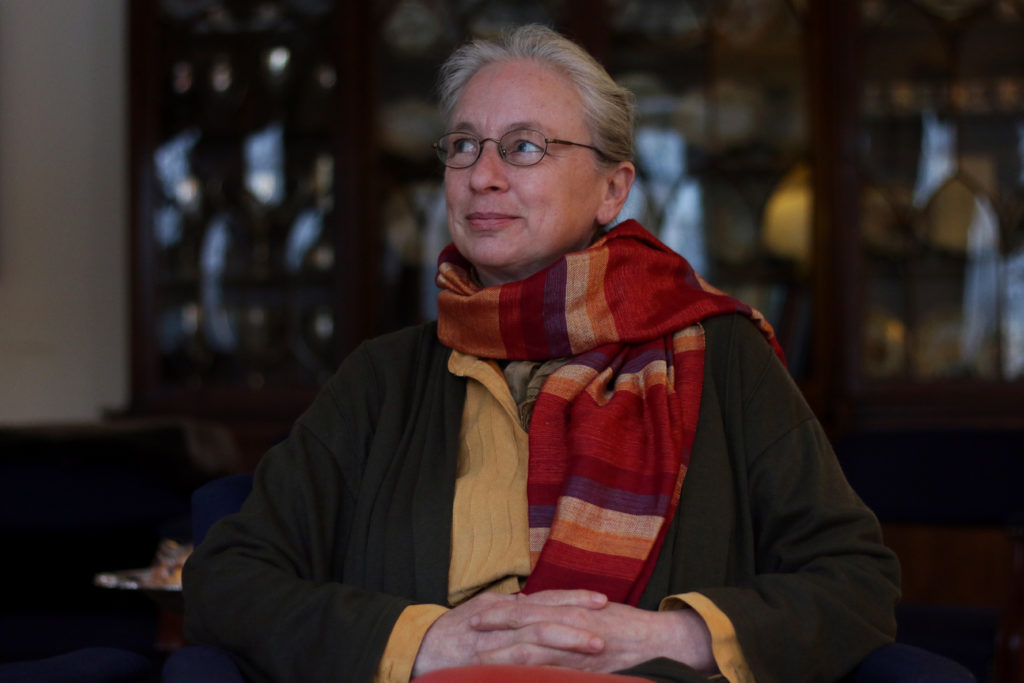The sustainability office is continuing its “listening tour” to garner feedback on the sustainability minor this semester, but officials declined to say what responses they have received so far.
Tara Scully, the director of the sustainability minor, said she spoke with “a number” of professors throughout the last semester in formal and informal meetings to get feedback on the direction of the minor program. She said the listening sessions tap a “critical mass of faculty members” working on sustainability issues who can help guide the office’s educational and research endeavors and sustainability curricula across multiple disciplines.
“The purpose of our ‘listening tour’ is to listen; to gather as much insight as we can into GW – its strengths, weaknesses and the goals of its stakeholders – to ensure we are continually raising the bar,” she said in an email.
Scully said that because the feedback sessions took place both one-on-one and in groups, she is “unsure” of the number of faculty who participated. She declined to say what feedback faculty provided and how the sustainability office responded.
Officials announced the listening tour in September amid an overall effort to grow and engage more freshmen in the minor.
“We find it imperative to work together in order to cultivate the next generation of change agents necessary to tackle the world’s most pressing problems, all of which are inextricably bound to sustainability,” Scully said.
She said the office does not know how many meetings will occur this semester, though one feedback session was canceled last week because of poor weather, according to the office’s Facebook page.
Five of the seven faculty teaching courses in the minor this semester said they did not attend the listening sessions. One professor in the minor did not return multiple requests for comment, and the seventh professor is Scully.
Two faculty who have taught courses in the minor in the past said they did not participate in the listening sessions.
Robert Orttung, an associate research professor of international affairs and director of research for GW Sustainability Collaborative, said he attended “some” sessions and “dozens” of faculty attended. He declined to say which faculty attended these sessions.
He said sessions aimed to discuss how to use already-available resources to improve the minor. Some professors that students should get more involved in research with sustainability professors, he said.
“The students often bring in new, interesting ideas, and obviously, they have a better command of social media and online techniques than I do,” he said.
He added that the sustainability office will host weekly lunches this semester after faculty asked for more collaboration and communication across multiple departments. He said an increased number of faculty working together will increase the quality of research and academia because sustainability is multifaceted and can be studied from angles like health and business.
“I think GW could make itself more prominent in this area by bringing together those resources and showing that they’re interconnected,” Orttung said.
Peter LaPuma, an associate professor of environmental and occupational health, said he did not attend a listening session because he was not aware that they occurred.
He said faculty in the minor received an email from Scully, the minor director, last semester asking whether professors wanted to change different aspects of the program, like removing academic tracks. The proposals stemmed from student suggestions, he said.
LaPuma said these would be the latest “tweaks” that have been made to the minor over the years, including changes to the introduction course.
“We are getting more open as far as what students can select,” he said.
He said that if he had given feedback, he would want the program to be more flexible for students in programs like engineering and nursing that have intensive credit requirements. Students in a variety of majors would add other perspectives to the courses, creating a better environment for learning from each other, he said.
“Anytime in a lot of these programs, the goal is to get the students to acknowledge and understand different disciplines,” he said. “If they had more participation, all students will have a more well-rounded experience.”
Michele Friend, an associate professor of philosophy who teaches a class in the minor on philosophy and the environment, said she did not attend a listening session because she focuses on her course instead of the management of the minor. She said that if she had given feedback, she would have told officials to give the program more money to create a major or purchase a physical space for faculty to congregate and foster a community.
If the program were bigger, the minor could also have more pull to hire more professors to focus only on the program, she said.
“What I would want is a lot more attention to the program,” she said.





